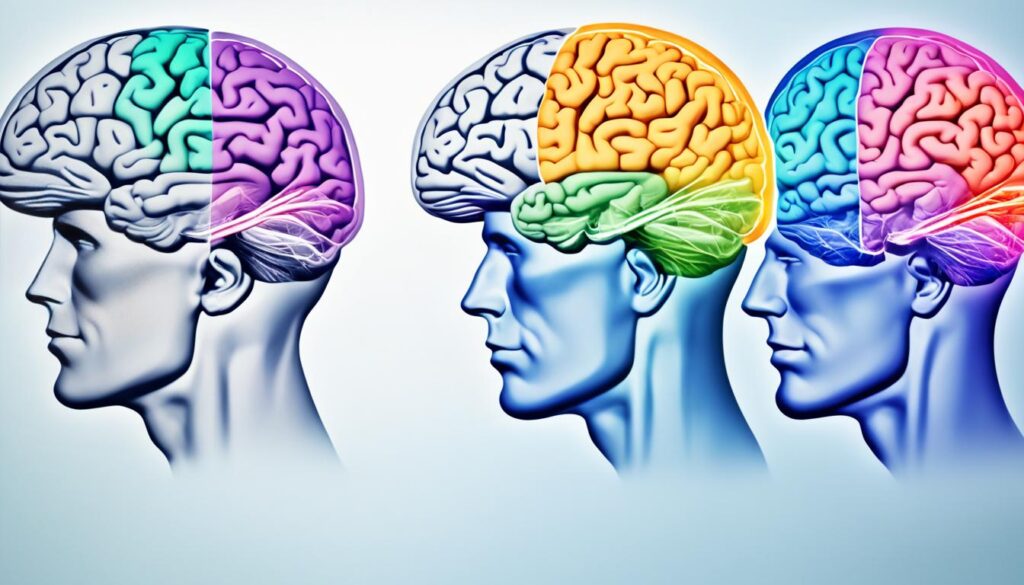Mental health disorders, such as depression or anxiety, can significantly impact the way people think, feel, and behave. There are more than 200 types of mental illnesses, ranging from mood disorders and anxiety disorders to psychotic disorders and eating disorders. Symptoms of mental health disorders usually improve with treatment, which may include medication, psychotherapy, alternative therapies, or brain stimulation therapy.
Mental illness is a common issue, with approximately 1 in 5 adults experiencing a mental illness in any given year. These mental health conditions can begin at any age, from childhood through later adult years, but most cases start earlier in life. The effects of mental illness can be temporary or long-lasting, and individuals can have more than one mental health disorder at the same time.
Untreated mental illness can lead to severe emotional, behavioral, and physical health problems, including unhappiness, relationship difficulties, substance abuse, self-harm, and medical complications. Understanding the various types of mental disorders, their symptoms, and the available treatment options is crucial for promoting better mental health outcomes.
Key Takeaways
- Mental health disorders can significantly impact a person’s thinking, feelings, and behavior.
- There are more than 200 different types of mental illnesses, including mood disorders, anxiety disorders, psychotic disorders, and eating disorders.
- Mental illness is common, with approximately 1 in 5 adults experiencing a mental illness in a given year.
- Symptoms of mental health disorders can improve with proper treatment, such as medication, psychotherapy, or alternative therapies.
- Untreated mental illness can lead to severe emotional, behavioral, and physical health problems.
Introduction to Mental Health Issues
Mental illness, also called mental health disorders, refers to a wide range of mental health conditions that affect a person’s mood, thinking and behavior. Examples of mental illness include depression, anxiety disorders, schizophrenia, eating disorders and addictive behaviors. Many people have mental health concerns from time to time, but a mental health concern becomes a mental illness when ongoing signs and symptoms cause frequent stress and affect a person’s ability to function.
Definition of Mental Health Issues
Mental health issues, or mental disorders, are medical conditions that can disrupt a person’s thinking, feeling, mood, ability to relate to others and daily functioning. They are often associated with distress and/or problems functioning in social, work or family activities. Mental illnesses can range from mild to severe and can be chronic or episodic.
Prevalence and Impact on Society
Mental illness is a leading cause of disability, and untreated mental illness can lead to a range of complications, including unhappiness, relationship difficulties, substance abuse, self-harm, and medical problems. Mental illness is common, with about 1 in 5 adults in the United States experiencing a mental illness in any given year. The impact of mental health issues on individuals, families, and communities can be significant, highlighting the importance of understanding, prevention, and treatment.
Types of Mental Disorders

The realm of mental disorders encompasses a diverse array of conditions that can profoundly impact an individual’s mood, thoughts, and behaviors. From mood disorders to anxiety disorders and psychotic disorders to eating disorders, each type presents unique challenges and requires tailored treatment approaches.
Mood Disorders
Mood disorders, such as major depressive disorder, persistent depressive disorder (dysthymia), and bipolar disorder, are characterized by persistent and pervasive changes in an individual’s emotional state. These disorders can significantly affect a person’s ability to function in daily life, relationships, and overall well-being.
Anxiety Disorders
Anxiety disorders, including generalized anxiety disorder, panic disorder, social anxiety disorder, and obsessive-compulsive disorder, are characterized by excessive fear, worry, and apprehension that can interfere with a person’s ability to perform everyday tasks and maintain healthy relationships.
Psychotic Disorders
Psychotic disorders, such as schizophrenia and schizoaffective disorder, involve distorted awareness and thinking, often leading to hallucinations, delusions, and a detachment from reality. Individuals with these disorders may experience significant challenges in managing their thoughts, emotions, and behaviors.
Eating Disorders
Eating disorders, including anorexia nervosa, bulimia nervosa, and binge-eating disorder, are characterized by unhealthy and distorted attitudes and behaviors towards food, body image, and weight. These disorders can have severe physical and psychological consequences if left untreated.
Understanding the diverse types of mental disorders and their unique characteristics is crucial for ensuring proper diagnosis, treatment, and management of these conditions. By recognizing the various manifestations of mental health issues, individuals and healthcare providers can work together to develop effective strategies for improving overall well-being.
Symptoms of Mental Health Issues

Signs and symptoms of mental illness can vary, depending on the specific disorder and other factors. Mental illness symptoms can affect a person’s emotions, thoughts, and behaviors. Examples of emotional symptoms include feeling sad or down, excessive fears or worries, and extreme mood changes. Behavioral symptoms may include withdrawal from friends and activities, significant tiredness or low energy, and trouble coping with daily problems or stress. Cognitive symptoms can involve confused thinking, reduced ability to concentrate, and difficulty understanding and relating to situations and people. Sometimes, symptoms of a mental health disorder may also manifest as physical problems, such as stomach pain, headaches, or other unexplained aches and pains.
Emotional Symptoms
Emotional symptoms of mental illness can include a wide range of experiences, such as feeling sad or down, excessive fears or worries, and extreme mood changes. These emotional disturbances can significantly impact an individual’s daily life and overall well-being.
Behavioral Symptoms
Behavioral symptoms of mental illness may involve withdrawal from friends and activities, significant tiredness or low energy, and trouble coping with daily problems or stress. These behavioral changes can make it challenging for individuals to function in their everyday lives.
Cognitive Symptoms
Cognitive symptoms of mental illness can include confused thinking, reduced ability to concentrate, and difficulty understanding and relating to situations and people. These cognitive impairments can hinder an individual’s ability to process information, make decisions, and engage effectively with their environment.
Causes and Risk Factors

Mental illnesses are complex conditions that can arise from a combination of genetic and environmental factors. Understanding the underlying causes and risk factors associated with mental health issues is crucial for developing effective prevention and treatment strategies.
Genetic Factors
Genetic predisposition plays a significant role in the development of mental illness. Studies have shown that individuals with a family history of mental disorders, such as depression, anxiety, or schizophrenia, are more likely to develop similar conditions themselves. Inherited traits can influence the brain’s chemistry, structure, and function, contributing to the onset of various mental health problems.
Environmental Factors
Environmental exposures and life experiences can also contribute to the development of mental illness. Traumatic events, such as abuse, neglect, or exposure to violence, can increase the risk of conditions like post-traumatic stress disorder (PTSD) and depression. Chronic stress, substance abuse, and certain medical conditions, such as chronic pain or neurological disorders, have also been linked to an increased risk of mental health issues.
Brain Chemistry and Structure
Imbalances in the brain’s natural chemicals, known as neurotransmitters, can lead to changes in brain function and the onset of emotional disorders. For example, low levels of serotonin are associated with depression, while an excess of dopamine can contribute to the development of psychotic disorders like schizophrenia. Additionally, structural abnormalities or injuries to the brain can also affect mental health, as seen in cases of traumatic brain injury or neurodegenerative diseases.
The interplay between genetic, environmental, and biological factors contributes to the complex nature of mental health issues. By understanding these causes and risk factors, healthcare providers and researchers can work towards improving prevention, early intervention, and personalized treatment approaches for individuals living with mental health conditions.
Mental Health Issues

Mental health issues, also known as mental disorders or mental illnesses, refer to a wide range of conditions that affect a person’s mood, thinking, and behavior. These mental health issues can significantly impact a person’s daily life, relationships, and overall well-being. Some of the most common mental disorders include depression, anxiety disorders, bipolar disorder, schizophrenia, and eating disorders.
While the specific causes of mental health issues can vary, they are often the result of a combination of genetic, environmental, and biological factors. Proper diagnosis and treatment are crucial for managing mental health conditions and improving quality of life for people with mental illness or mental disorders.
Addressing mental health challenges and providing support for people with mental health problems is essential for promoting overall well-being and reducing the burden of common mental disorders on individuals, families, and communities.
Diagnosis and Assessment

Diagnosing a mental health condition typically involves a comprehensive evaluation by a mental health professional, such as a psychiatrist, psychologist, or licensed therapist. The diagnostic process may include several key steps to ensure an accurate assessment and appropriate treatment plan.
Diagnostic Criteria
Mental health professionals utilize standardized diagnostic criteria, like those outlined in the Diagnostic and Statistical Manual of Mental Disorders (DSM), to identify the specific mental disorder affecting the individual. This systematic approach helps ensure a thorough and objective evaluation of the person’s symptoms, behaviors, and overall functioning.
Evaluation Process
The evaluation process for diagnosing a mental health issue often involves a clinical interview, psychological testing, and a review of the patient’s medical and mental health history. This comprehensive assessment helps the mental health professional gather the necessary information to make an accurate diagnosis and develop an appropriate treatment strategy.
Role of Mental Health Professionals
Mental health professionals, including psychiatrists, psychologists, therapists, and social workers, play a crucial role in the diagnosis and assessment of mental health issues. These experts use their specialized knowledge and clinical expertise to provide an accurate diagnosis, develop an individualized treatment plan, and monitor the patient’s progress over time. Their involvement is essential for ensuring effective management of mental health conditions.
Treatment Options

Effectively managing mental health conditions often involves a multi-faceted approach, combining various treatment options tailored to the individual’s needs. These treatment modalities may include:
Psychotherapy
Psychotherapy, also known as talk therapy, can be a highly effective form of mental health treatment. This approach involves working with a mental health professional, such as a psychologist or licensed therapist, to develop coping strategies, address underlying issues, and gain a better understanding of one’s thoughts, emotions, and behaviors. Cognitive-behavioral therapy (CBT) and dialectical behavior therapy (DBT) are two common forms of psychotherapy that have been shown to be particularly beneficial in managing a wide range of mental health conditions, including depression, anxiety disorders, and borderline personality disorder.
Medication Management
In conjunction with psychotherapy, medication management can play a crucial role in managing mental health issues. Medications like antidepressants, antipsychotics, mood stabilizers, and anti-anxiety medications can help regulate brain chemistry and alleviate the symptoms of various mental health disorders. A mental health professional, such as a psychiatrist, will work closely with the individual to determine the most appropriate medication and dosage, monitor the patient’s response, and make adjustments as needed.
Alternative Therapies
In addition to traditional psychotherapy and medication management, alternative therapies can also be beneficial in managing mental health conditions and promoting overall well-being. Mindfulness-based practices, such as meditation and yoga, can help individuals develop greater self-awareness and improve their ability to cope with stress and difficult emotions. Exercise, support groups, and other complementary approaches can also play a supportive role in the treatment of mental health issues.
The specific treatment plan for an individual with a mental health condition will depend on their unique circumstances, including the type and severity of their disorder, personal preferences, and the recommendations of their mental health care team. Often, a combination of these treatment options, tailored to the individual’s needs, can be the most effective approach to managing mental health issues and improving quality of life.
Living with a Mental Health Condition

Living with a mental health condition can present various challenges, but with the right strategies and support, individuals can manage their symptoms and improve their overall well-being. Developing effective coping mechanisms and surrounding oneself with a strong support system are crucial steps in this journey.
Coping Strategies
Individuals living with a mental health condition can benefit from practicing self-care, which may include engaging in stress management techniques, such as mindfulness, meditation, or regular exercise. These activities can help promote emotional well-being and build resilience. Additionally, finding activities that bring joy and a sense of purpose can contribute to overall mental health and quality of life.
Support Systems
Cultivating a supportive network is essential for those living with a mental health condition. This may involve reaching out to family, friends, or joining local support groups to share experiences and receive emotional and practical support. Connecting with mental health professionals, such as therapists or counselors, can also provide valuable guidance and tools for managing symptoms. Engaging with community resources, such as support groups or mental health organizations, can further enhance an individual’s support network and access to necessary services.
Actively participating in treatment, maintaining healthy lifestyle habits, and building a strong support system are crucial steps for individuals living with mental health conditions to manage their symptoms and improve their overall well-being. By embracing these strategies, they can enhance their resilience and quality of life while navigating the challenges associated with their mental health condition.
Prevention and Early Intervention

While there is no surefire way to prevent mental illness, taking proactive steps to promote mental health awareness and identify early warning signs can help individuals and communities address mental health issues more effectively.
Promoting Mental Health Awareness
Increasing education and understanding about mental health issues, destigmatizing mental illness, and encouraging open discussions can help individuals recognize the importance of seeking support. Mental health education programs in schools, workplaces, and healthcare settings play a crucial role in raising awareness and reducing the stigma surrounding mental health conditions.
Identifying Early Warning Signs
Being aware of the early symptoms of mental health conditions, such as changes in mood, behavior, or cognitive function, and seeking professional help promptly, can improve the chances of successful intervention and treatment. Regular mental health screenings in community programs, schools, and healthcare settings can help identify these early warning signs and connect individuals with the necessary resources and support.
By fostering a greater understanding of mental health and encouraging early action, individuals, communities, and healthcare settings can play a role in preventing the development or worsening of mental health conditions.
Stigma and Discrimination

Despite increased awareness and understanding, individuals with mental health conditions often face stigma and discrimination in various aspects of their lives. Stigma, or negative attitudes and stereotypes towards mental illness, can lead to social isolation, employment challenges, and barriers to accessing quality healthcare. Individuals with mental health conditions may also experience discrimination, which can further exacerbate their struggles.
Addressing stigma and promoting greater acceptance and support for those living with mental health issues is crucial for improving outcomes and ensuring that individuals with mental health conditions can access the resources and support they need. Mental health advocacy efforts, including public education campaigns and policy changes, can play a vital role in challenging the attitudes towards mental illness and creating a more inclusive and supportive environment for those affected.
| Challenge | Impact |
|---|---|
| Stigma | Leads to social isolation, employment challenges, and barriers to healthcare access |
| Discrimination | Further exacerbates the struggles of individuals with mental health conditions |
| Mental Health Advocacy | Crucial for challenging attitudes towards mental illness and creating a more inclusive and supportive environment |
Also Read: Optimizing Wellness: Crafting Personalized Health Goals For Success
Conclusion
Mental health issues, also known as mental disorders or mental illnesses, encompass a wide range of conditions that can significantly impact an individual’s mood, thinking, and behavior. These issues are relatively common, with about 1 in 5 adults experiencing a mental illness in a given year. Understanding the different types of mental disorders, their symptoms, and the various treatment options available is crucial for promoting better mental health outcomes.
From mood disorders and anxiety disorders to psychotic disorders and eating disorders, the mental health issues that individuals may face are diverse and can have a profound impact on their overall well-being. Recognizing the symptoms of these conditions, seeking treatment, and building a strong support system are essential steps in managing mental health challenges and improving quality of life.
Moreover, addressing the stigma and discrimination often associated with mental health conditions is crucial for ensuring that individuals with mental disorders can access the resources and support they need. Through mental health advocacy and the promotion of mental health resources, we can work towards a future where understanding mental health and improving mental health are priorities for individuals, communities, and healthcare systems alike.
FAQs
Q: What is mental health and why is it important?
A: Mental health refers to our emotional, psychological, and social well-being. It is important because it affects how we think, feel, and act, and helps determine how we handle stress, relate to others, and make choices.
Q: What are common mental health disorders?
A: Some common mental health disorders include post-traumatic stress disorder, bipolar disorder, schizophrenia, depression, anxiety disorders, and eating disorders.
Q: What are the symptoms of bipolar disorder?
A: Symptoms of bipolar disorder include extreme mood swings, changes in energy and activity levels, difficulty in sleeping, and irrational behavior.
Q: How are mental health disorders diagnosed?
A: Mental health disorders are diagnosed through a combination of medical history, physical exams, and psychological evaluations. Genetics play a role in the development of some mental disorders.
Q: What is psychosis?
A: Psychosis is a symptom of various mental illnesses where a person may have difficulty distinguishing between what is real and what is not. It can involve hallucinations, delusions, and disorganized thinking.
Q: How can one develop a mental disorder?
A: Mental disorders can develop due to a combination of genetic, environmental, and psychological factors. Stressful life events, trauma, and substance use can also contribute to the development of mental health disorders.
Q: What are the signs of mental illness in adolescents?
A: Signs of mental illness in adolescents may include changes in mood, behavior, eating or sleeping patterns, loss of interest in activities, and difficulty concentrating.
Source Links
- https://my.clevelandclinic.org/health/diseases/22295-mental-health-disorders
- https://www.betterhealth.vic.gov.au/health/servicesandsupport/types-of-mental-health-issues-and-illnesses
- https://www.mayoclinic.org/diseases-conditions/mental-illness/symptoms-causes/syc-20374968




